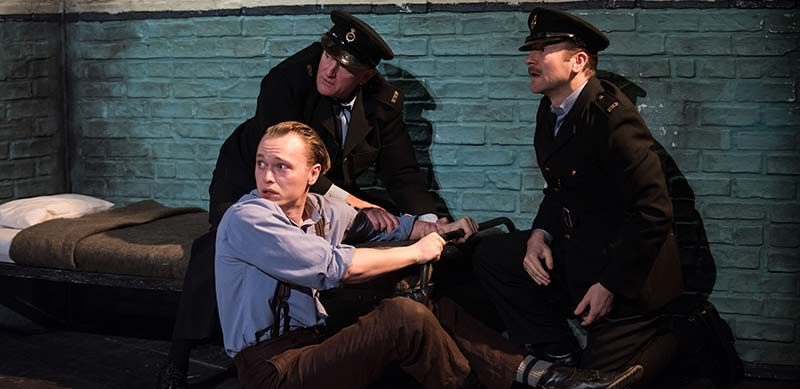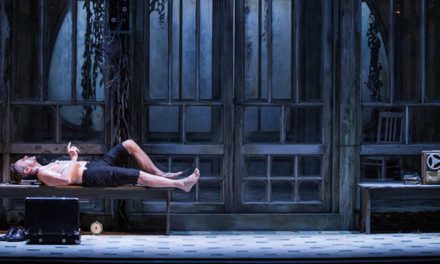New Yorkers have split into factions on Martin McDonagh since his plays first showed up here two decades ago. The flippant relationship to violence, the motley assortment of cuddly killers, the casual, tongue-in-cheek racism and deep-baked cynicism, even his irritation at being compared to Quentin Tarantino: all this and more was held against him in countless reviews, essays, and blogs years before the Best Picture Oscar nomination for Three Billboards Outside Of Ebbing, Missouri made him a household name.
McDonagh’s fans have usually taken it all with a grain of salt. The callous, of course, just like brutality and horror, and the thoughtful see his uses of them as critical, not cynical or degrading. The writing is often deliberately offensive, for sure, but it can also be sensitive, and it sometimes rises to a brilliant, Ortonesque species of political farce. The complication with McDonagh is that he can’t be reduced to blood-and-gore pandering.
Hangmen, his new play at The Atlantic Theatre, is not one of his best. It’s, unfortunately, one of his hollower creations like The Lonesome West, The Lieutenant Of Inishmore, and A Behanding In Spokane, where the farcical terror feels routine and the laughs are mostly at the expense of pig-headed brutes whose portrayals are stereotypical and condescending. This is the sort of McDonagh play that has convinced so many people of his low motives and kept them from giving his better works like The Pillowman and Three Billboards a fair chance.
For me, McDonagh’s claim to serious attention lies in his signature theme: the absurdity of violent justice. His plays typically feature twisted characters who settle scores, nurse grudges, pursue revenge, or in this latest case carry out judicial killings, invariably without knowing all the facts. As the audience gathers those facts, the characters look more and more ridiculous, and when he’s on his game the plays work a sort of miracle in which the clowns and dupes come to seem all the more relevant to us for their very ridiculousness.
These better plays—The Beauty Queen Of Leenane and The Pillowman, for instance—pull off the improbable balancing act of grossing us out while keeping us interested in their wacky meditations on right and wrong. The sensationalized violence ends up feeling necessary to their moral reflections, which is why they can feel brightly indignant, even fleetingly progressive, rather than cynical.
None of that happens, alas, with a play like Hangmen. Its action opens in 1963 Britain in a grim, fluorescent-lit room where a guy named Hennessy (Gilles Geary) sits with his head in his hands pleading for mercy from prison guards and Harry the hangman (Mark Addy). Hennessy has been convicted of abducting and killing a girl, but he swears he’s innocent, struggles and protests in a way that makes you feel he is (Syd the stuttering assistant: “If you’d’ve just tried to relax, you could’ve been dead by now”), and he’s presently hanged anyway.
It’s a disturbing scene, reminiscent of the desperate and ambiguous interrogation that opens The Pillowman, which launches that play’s fascinating meditation on copycat violence. Hennessy’s hanging might have launched an equally fascinating meditation on the barbarity of state execution, possibly taking a hint from Shakespeare whose prisoner Barnardine famously shouted: “I will have more time to prepare me, or they shall beat out my brains with billets.” Instead, McDonagh aims low and stays low. Pot-bellied Harry, irked at being dissed by Hennessy as a second-rate hangman, marches off to get breakfast, and the rest of the play is driven largely by his inferiority complex. Capital punishment recedes as comic background.
The next scene picks up two years later in the dingy pub Harry runs with his wife Alice (Sally Rogers), on the day when the country has abolished hanging. A trio of regulars is there getting pissed and a plucky reporter is hoping for a comment. Harry haughtily refuses for a while (“one thing I’ve always prided myself on…is that on the subject of hanging, I’ve always chosen to keep me own counsel”), but he then decides to talk to the guy, goaded by the prospect of his hated rival Albert Pierrepoint beating him into the papers (“I’m just as good as bloody Pierrepoint!”). A few juicy quotes about Harry’s opinions on the electric chair and the guillotine come out of this, but what the scene primarily establishes is that petty rivalry is what really matters in the play.
The plot shows signs of deepening when a slick stranger named Mooney (Johnny Flynn) arrives, sporting a London accent, a nattier suit than any of the northern hicks, and a menacing air. He chats up Harry’s moody teenage daughter Shirley (Gaby French), poses niggling, resentful questions about Hennessy’s innocence, and is thus planted to convince us he’s a creepy criminal prowling brazenly under everyone’s nose. Harry’s impulse to act rashly on that assumption sparks the string of misunderstandings and calamities that rush Hangmen to its savage climax. Once again, though, what always seems to matter is how hilariously dumb everyone is. Three Billboards features a passel of mercilessly mocked dumb hicks too. The difference is that those morons are seen against the foils of fiercely intelligent Mildred (Frances McDormand) and well-intentioned Chief Willoughby (Woody Harrelson).
It should be said that the acting in this Atlantic production directed by Matthew Dunster is exceptionally good, particularly Addy, Flynn, Rogers and Reece Shearsmith (who plays Syd). The characterizations are ferociously precise, and they’re greeted with peals of duly earned laughter. It could be that, at another moment in time, I might laugh at a black comedy like this too even though its social critique is pathetically thin. Knowing what I do about McDonagh’s potential, though, and distressed as I am by the daily outrages perpetrated by countless real-world Hangman-Harrys, I just couldn’t summon a titter.
This article originally appeared in Jonathan Kalb on February 27, 2018, and has been reposted with permission.
This post was written by the author in their personal capacity.The opinions expressed in this article are the author’s own and do not reflect the view of The Theatre Times, their staff or collaborators.
This post was written by Jonathan Kalb.
The views expressed here belong to the author and do not necessarily reflect our views and opinions.


















